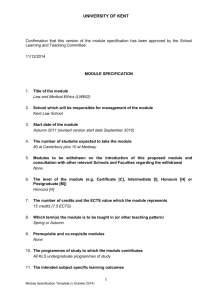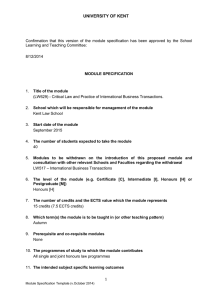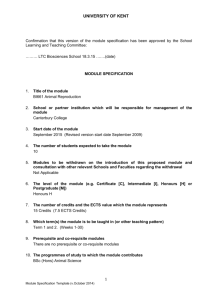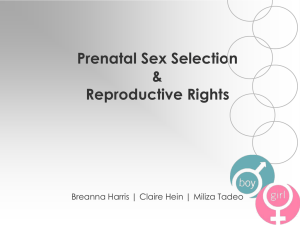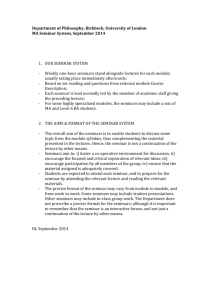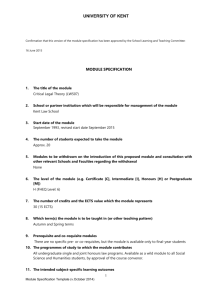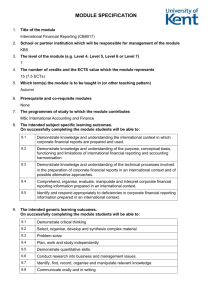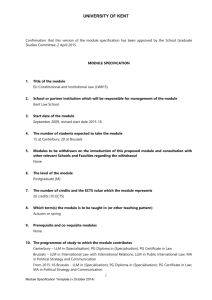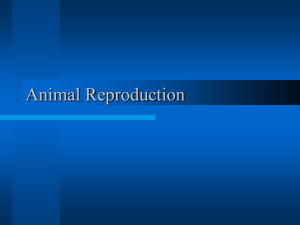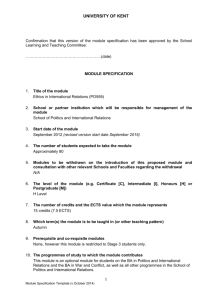University of Kent
advertisement
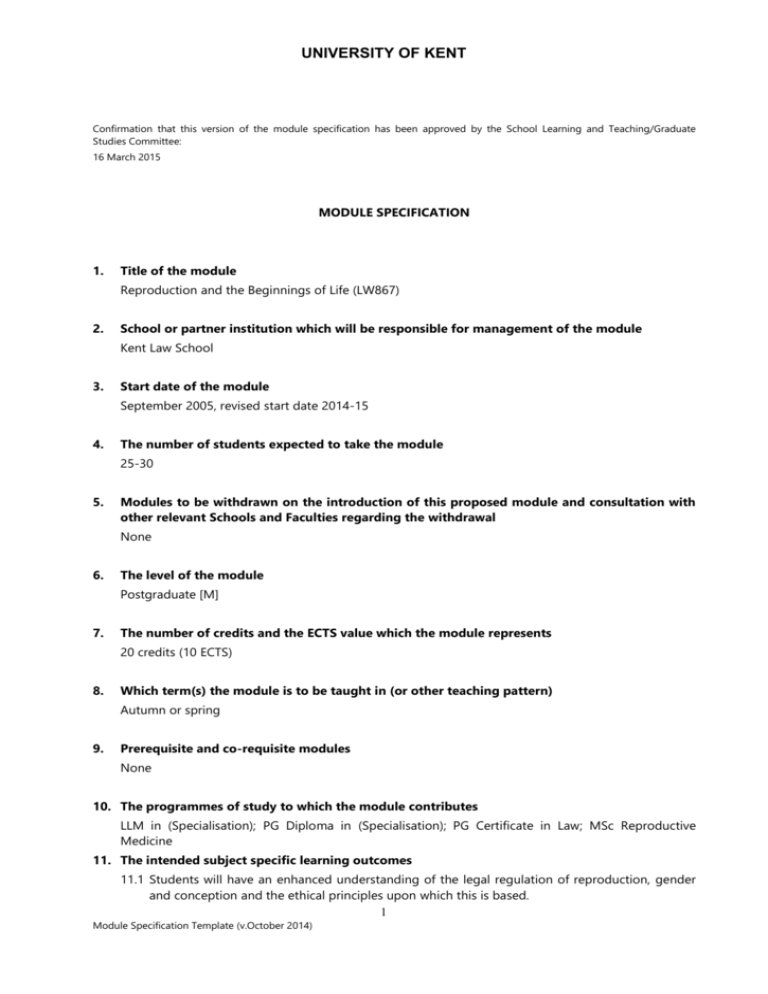
UNIVERSITY OF KENT Confirmation that this version of the module specification has been approved by the School Learning and Teaching/Graduate Studies Committee: 16 March 2015 MODULE SPECIFICATION 1. Title of the module Reproduction and the Beginnings of Life (LW867) 2. School or partner institution which will be responsible for management of the module Kent Law School 3. Start date of the module September 2005, revised start date 2014-15 4. The number of students expected to take the module 25-30 5. Modules to be withdrawn on the introduction of this proposed module and consultation with other relevant Schools and Faculties regarding the withdrawal None 6. The level of the module Postgraduate [M] 7. The number of credits and the ECTS value which the module represents 20 credits (10 ECTS) 8. Which term(s) the module is to be taught in (or other teaching pattern) Autumn or spring 9. Prerequisite and co-requisite modules None 10. The programmes of study to which the module contributes LLM in (Specialisation); PG Diploma in (Specialisation); PG Certificate in Law; MSc Reproductive Medicine 11. The intended subject specific learning outcomes 11.1 Students will have an enhanced understanding of the legal regulation of reproduction, gender and conception and the ethical principles upon which this is based. 1 Module Specification Template (v.October 2014) UNIVERSITY OF KENT 11.2 Students will appreciate the relationship between medical law and feminist and ethical concerns in relation to contraception, abortion and new reproductive technologies. 11.3 Students will gain insight into the pragmatic, ethical and theoretical factors impacting on the regulation of assisted conception and collaborative reproduction. 11.4 Students will be able to form a conceptual overview of the continuing debates over the appropriate limits upon reproductive autonomy in relation to notions such as dignity as these impact on the regulation of reproduction. 12. The intended generic learning outcomes On successful completion of the module students will demonstrate the following skills. 12.1 Analytical thought and writing: reflect upon complex ideas and arguments; digest, analyse and test scholarly views; relate scholarly ideas and arguments to issues and circumstances in the contemporary medical law and ethics; summarise and analyse scholarly arguments in writing. 12.2 Advocacy and defence: formulate an opinion in response to an issue or question, construct coherent and persuasive arguments to advocate one’s view and defend that view against criticism. 12.3 Communication and presentation skills: prepare oral and written presentations of information and viewpoints to peers; respond to comment and criticism from peers; lead and manage group discussion. 12.4 Problem solving: respond at short notice to questions and challenges making use of knowledge, analytic skills and perspectives acquired in the module. 13. A synopsis of the curriculum The curriculum includes the overall ethical and regulatory framework within which a continuing societal debate over appropriate limits on reproductive autonomy takes place. Contextual ethical and legal concepts will be explored in relation to controversial topics such as ‘designer babies’, cloning and ‘unnatural’ motherhood. The role of regulatory oversight of reproduction and the fundamental assumptions upon which this is based, such as compulsory altruism, will be subjected to legal and ethical critique. 14. Indicative Reading List Emily Jackson, Medical Law: Text and Materials (2013, 3rd Edition). This will be supplemented by a range of academic literature and other materials, including media reports. 15. Learning and Teaching Methods, including the nature and number of contact hours and the total study hours which will be expected of students, and how these relate to achievement of the intended module learning outcomes Two hours of staff/student contact each week involving interactive lectures and discursive seminars will be conducted throughout the module excluding reading and writing weeks. The remaining 180 hours are dedicated to private study time. Students are expected to prepare for and participate in all classes. The module is allocated 200 study hours. Ethical and legal issues which centre upon reproduction and the beginning of life involve fundamental social values. In societies characterised by value pluralism, this leads to a continuing lack of consensus over how, if at all, reproductive choice should be limited. As a consequence, this module fosters a critical and socio-legal contextual critique of medical law and ethics, particularly in 2 Module Specification Template (v.October 2014) UNIVERSITY OF KENT relation to feminist concerns. This module will provide students with the opportunity to conduct detailed analysis of specific topical issues here and will assist in the selection of suitable dissertation titles. Achievement of module learning outcomes: Interactive Lectures: The lectures will convey to students an overview of each topic, and draw out specific points of relevance and key issues in relation to the module’s theoretical framework for seminar discussion. This will address learning outcomes: 11.1-11.4, 12.1, and 12.4. Seminars: Seminars will be designed to enhance student understanding of both the law and the issues arising from the materials. Seminars will provide space for students to conduct detailed discussion on the points covered in the seminar readings and in the lectures, and will make space for students to evaluate the issues in discussion with their peers. Students will be pressed in seminars to present their thoughts clearly, justifying their positions through use of the materials provided. This will address learning outcomes: 11.1-11.4, 12.1-12.4. Seminar readings and seminar preparation: Students will be required to undertake required readings and are expected to undertake further research ahead of seminars. Seminar questions will be designed to both provide a detailed understanding of the legal framework and the socio-political history of the legal framework, as well as questions of policy and political rationality. This will address learning outcomes: 11.1-11.4 and 12.1-12.4. Independent research: Students will be expected to undertake independent research of appropriate sources. This will address learning outcomes: 11.4, 12.1. and 12.3. 16. Assessment methods and how these relate to testing achievement of the intended module learning outcomes The module is assessed by one essay of 4000 to 5000 words, including quotations and footnotes. A choice of essay titles relating to the topics covered in the module will be circulated and students will be invited to select one title. Students may write on another essay title with the agreement of the module convenor. The objective of the essay is to test the student's knowledge and understanding of the subject matter, research skills, analytical capacity and ability to express ideas in a clear and coherent manner upon a basis of the learning outcomes as described above. (11.1-4 and 12.1-4) 17. Implications for learning resources, including staff, library, IT and space None 18. The School recognises and has embedded the expectations of current disability equality legislation, and supports students with a declared disability or special educational need in its teaching. Within this module we will make reasonable adjustments wherever necessary, including additional or substitute materials, teaching modes or assessment methods for students who have declared and discussed their learning support needs. Arrangements for students with declared disabilities will be made on an individual basis, in consultation with the University’s disability/dyslexia support service, and specialist support will be provided where needed. 19. Campus where module will be delivered: Canterbury 3 Module Specification Template (v.October 2014)
